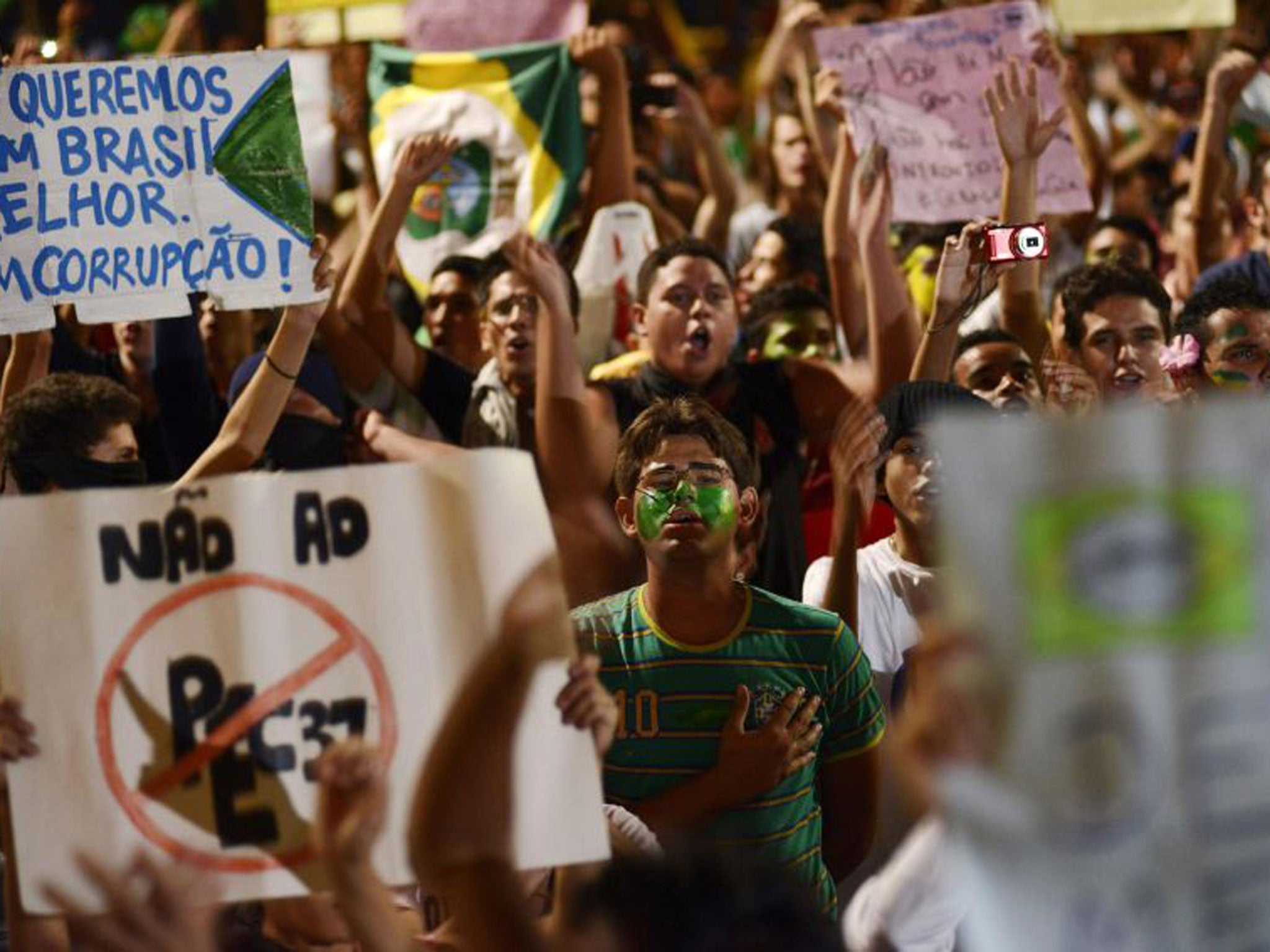
Your support helps us to tell the story
From reproductive rights to climate change to Big Tech, The Independent is on the ground when the story is developing. Whether it's investigating the financials of Elon Musk's pro-Trump PAC or producing our latest documentary, 'The A Word', which shines a light on the American women fighting for reproductive rights, we know how important it is to parse out the facts from the messaging.
At such a critical moment in US history, we need reporters on the ground. Your donation allows us to keep sending journalists to speak to both sides of the story.
The Independent is trusted by Americans across the entire political spectrum. And unlike many other quality news outlets, we choose not to lock Americans out of our reporting and analysis with paywalls. We believe quality journalism should be available to everyone, paid for by those who can afford it.
Your support makes all the difference.Protesters are full of hope that Brazil, the perennial pais do futuro (country of the future), might finally be stirring from its torpor. Numbers at the protests have backed such optimism. Over a million Brazilians flooded on to the streets on Thursday, and last night more were expected to turn out.
The most recent wave of protests began at the beginning of the month in Sao Paulo over what may seem an insignificant 20 centavo (7p) bus-fare hike. But the level of the increase was less important than what it represented. Once again, Brazilians felt they were being asked to pay an onerous price for a shoddy service. Buses in big cities are overcrowded, infrequent and journeys can take hours.
Now the leaderless, non-politically affiliated protest movement has a variety of goals. Better public healthcare is one. "I recently spent eight hours in a hospital waiting room with dengue," says Lee, a bank worker protesting on Friday. "People were sleeping on the floor." Another is an improved education system. "We work hard and pay high taxes. And we get nothing in return," he continues.
Frustration over the country's institutionalised corruption has attracted many to the protests. Influence-peddling scandals such as 2005's Mensalao ("big monthly allowance") affair and, more recently, the saga of Carlinhos Cachoeira, accused of running a political bribery network, have left many desperate for change.
Some protesters have focused on the £8bn spent on stadium and infrastructure work for next year's World Cup, seen as indefensible in a country with so many more pressing needs. The brutal tactics employed by the police have added to the indignation. Rubber bullets and tear gas have been used, often indiscriminately and at close range.
Plurality may be the defining feature of the protests. While economic growth has lifted millions of Brazilians from poverty and created a burgeoning lower middle class, the country remains highly divided. Yet the demonstrations have drawn people from all social groups. The lights of swanky flats have flicked on and off in support of students and workers protesting in the streets below. Sons and daughters of doctors and lawyers have found themselves in shadowy streets in the centre, chanting the national anthem alongside people from rough suburbs.
Both Rio and Sao Paulo cancelled bus-fare increases on Wednesday, and President Dilma Rousseff said that the profits from Brazil's oil resources would be invested in education. Thousands of overseas doctors are to be brought in to boost the health service, and there will be talks with representatives from protest groups. Many demonstrators, however, remain sceptical. "It's about doing, not about talking," said Lee.
It is not the first time Brazil has taken to the streets. There were the "painted faces" who helped bring down the crooked government of Fernando Collor in 1992, and the "Diretas Ja" campaign for democratic elections in the 1980s. Since then, the mood has been one of weary acceptance of corruption and awful public services.
"We're the children of those who fought against the dictatorship," said Lucio, a lawyer, at a demonstration in Belo Horizonte on Thursday. "But then we went to sleep." Now, it seems, Brazil may finally be waking up."
The protests continued in the city last night when thousands converged on the Mineirão football stadium, where the Japan vs Mexico Confederations Cup game was being played.
Unfortunately, they were met with baton rounds and tear gas. Shortly after the match, the streets were in flames and Belo Horizonte resembled a war zone. This revolution will not go quietly into the night.
Join our commenting forum
Join thought-provoking conversations, follow other Independent readers and see their replies
Comments